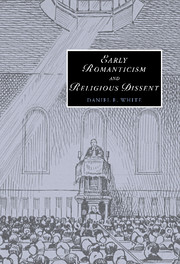Book contents
- Frontmatter
- Contents
- List of illustrations
- Acknowledgments
- Frequently cited texts
- Epigraph
- Introduction
- 1 “True Principles of Religion and Liberty”: liberal Dissent and the Warrington Academy
- 2 Anna Barbauld and devotional tastes: extempore, particular, experimental
- 3 The “Joineriana”: Barbauld, the Aikin family circle, and the Dissenting public sphere
- 4 Godwinian scenes and popular politics: Godwin, Wollstonecraft, and the legacies of Dissent
- 5 “Properer for a Sermon”: Coleridgean ministries
- 6 “A Saracenic mosque, not a Quaker meeting-house”: Southey's Thalaba, Islam, and religious nonconformity
- 7 Conclusion
- Notes
- Bibliography
- Index
- CAMBRIDGE STUDIES IN ROMANTICISM
2 - Anna Barbauld and devotional tastes: extempore, particular, experimental
Published online by Cambridge University Press: 22 September 2009
- Frontmatter
- Contents
- List of illustrations
- Acknowledgments
- Frequently cited texts
- Epigraph
- Introduction
- 1 “True Principles of Religion and Liberty”: liberal Dissent and the Warrington Academy
- 2 Anna Barbauld and devotional tastes: extempore, particular, experimental
- 3 The “Joineriana”: Barbauld, the Aikin family circle, and the Dissenting public sphere
- 4 Godwinian scenes and popular politics: Godwin, Wollstonecraft, and the legacies of Dissent
- 5 “Properer for a Sermon”: Coleridgean ministries
- 6 “A Saracenic mosque, not a Quaker meeting-house”: Southey's Thalaba, Islam, and religious nonconformity
- 7 Conclusion
- Notes
- Bibliography
- Index
- CAMBRIDGE STUDIES IN ROMANTICISM
Summary
“Mrs. Barbauld,” remembered until recently as the writer for children who criticized The Rime of the Ancient Mariner for being improbable and having no moral, was in the late eighteenth and early nineteenth centuries a prominent poet, essayist, hymnist, pamphleteer, reviewer, editor, educator, and children's writer. With the publication of William McCarthy and Elizabeth Kraft's The Poems of Anna Letitia Barbauld (1994) and Anna Letitia Barbauld: Selected Poetry and Prose (2002), the continuing reevaluation of her work has led critics to place her among the foremost poets of a revised late-eighteenth-century canon. The most intensely productive period of her poetic career, between the ages of twenty-two and thirty-one (from 1765–74), took place at Warrington, in the environment provided by the town and the Academy, culminating in her influential Poems published by Joseph Johnson in 1773 and reissued in expanded form in 1792. After her marriage in 1774 to Rochemont Barbauld, a French Protestant who had come to be educated at Warrington, the couple moved to Palgrave, where Rochemont had been offered the ministry of a Dissenting congregation. They remained there until 1785, sharing the management of a boarding school for boys. Following their resignation of the school and a tour of France, the Barbaulds settled in Hampstead, where they would remain until 1802. These years saw Anna Barbauld take part in the movement to repeal the Corporation and Test Acts, the attempt to abolish the slave trade, and the debate over the French Revolution.
- Type
- Chapter
- Information
- Early Romanticism and Religious Dissent , pp. 34 - 65Publisher: Cambridge University PressPrint publication year: 2007



